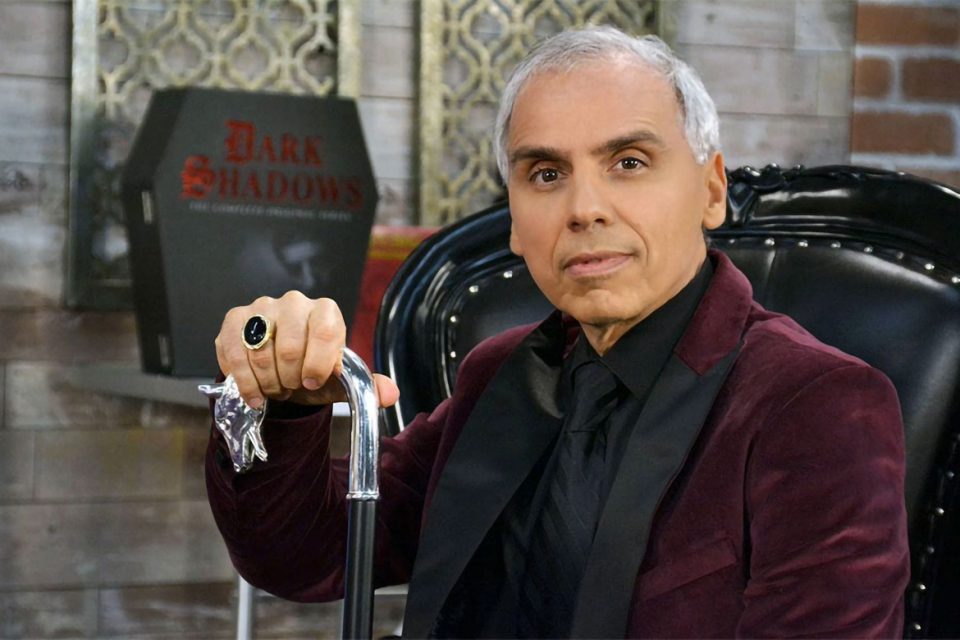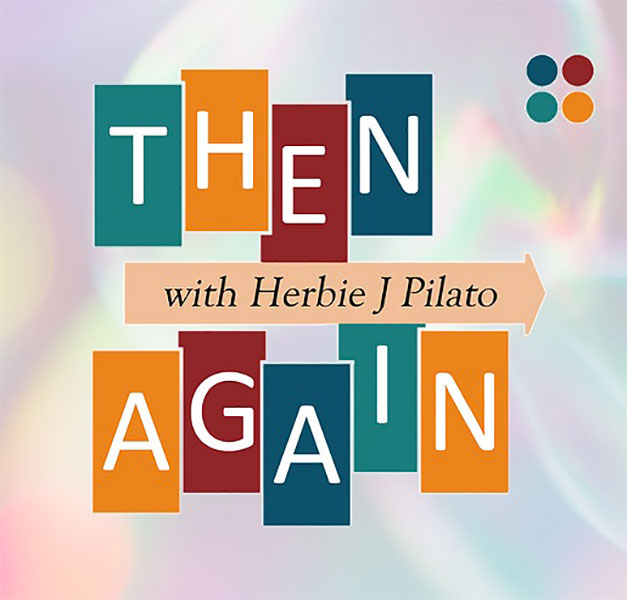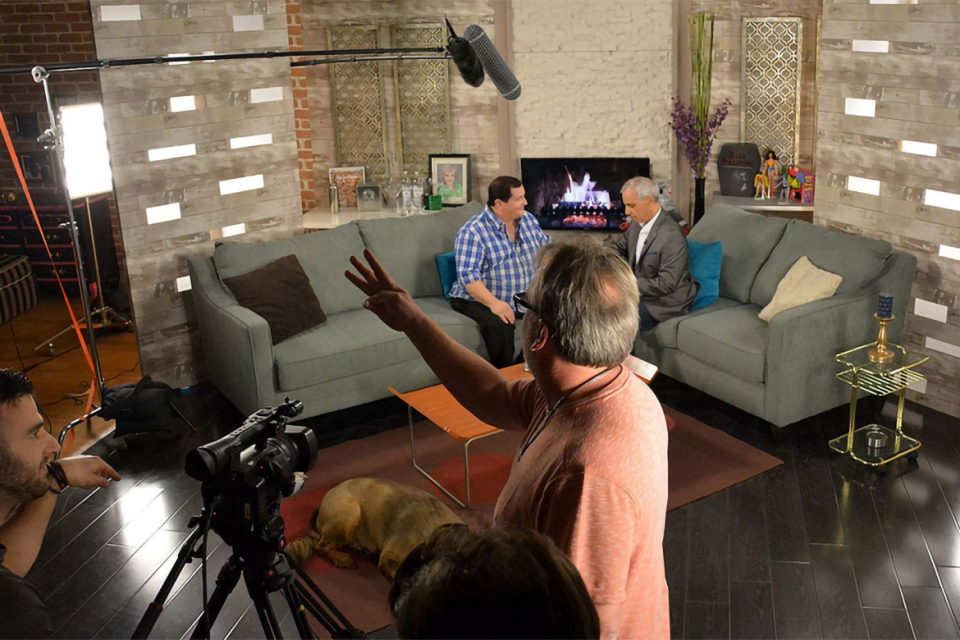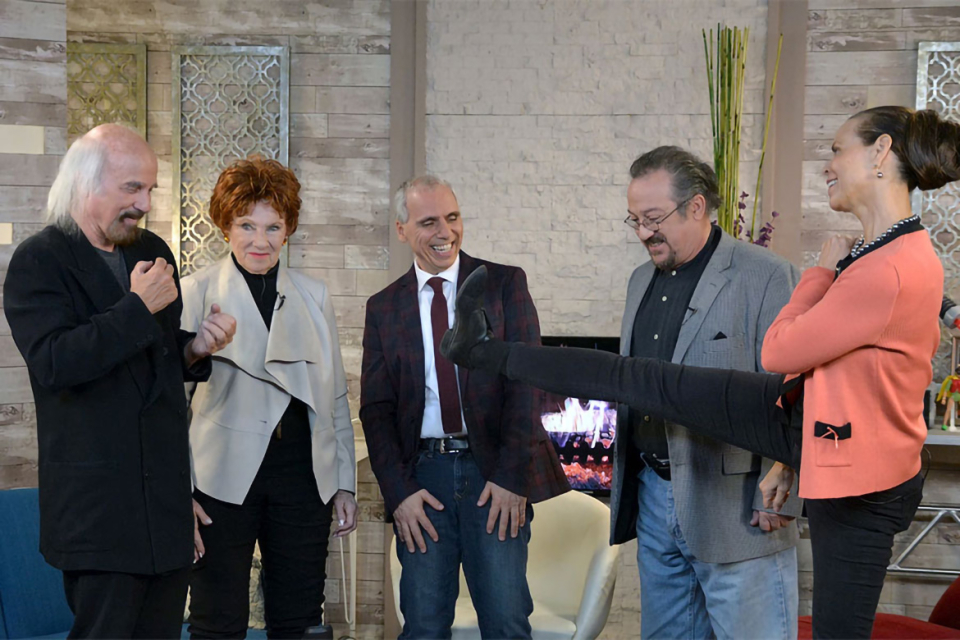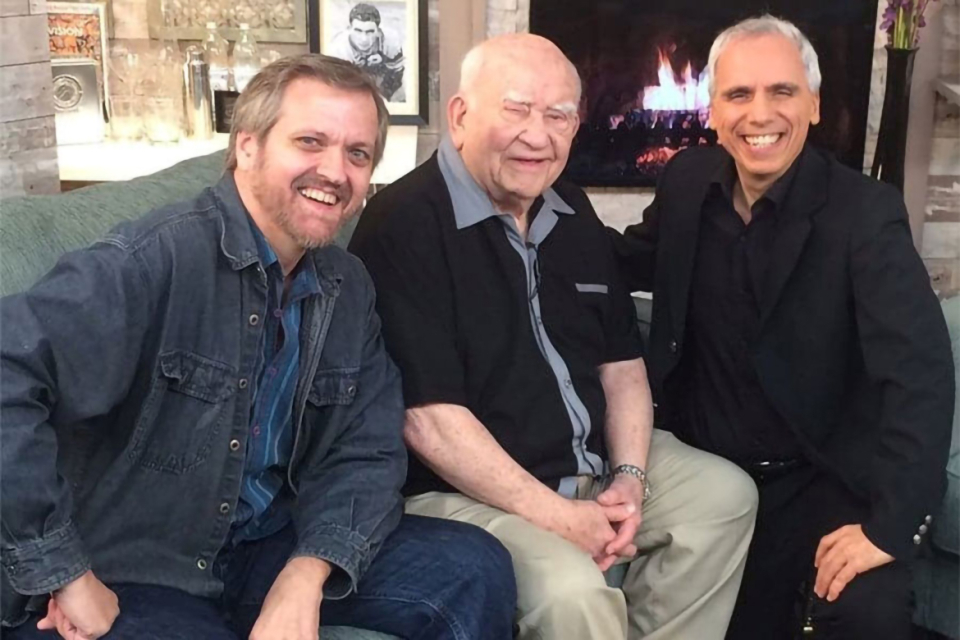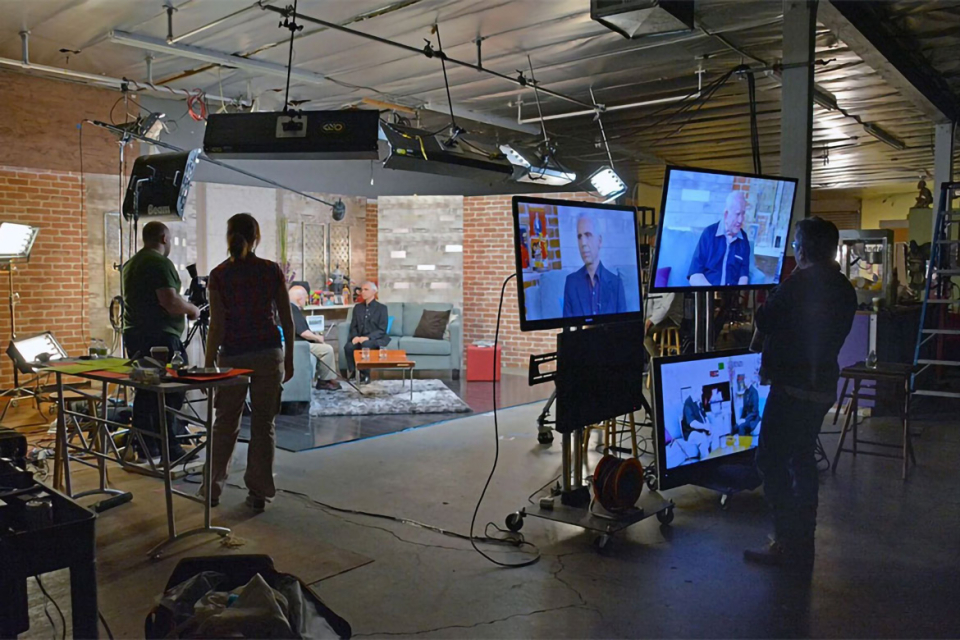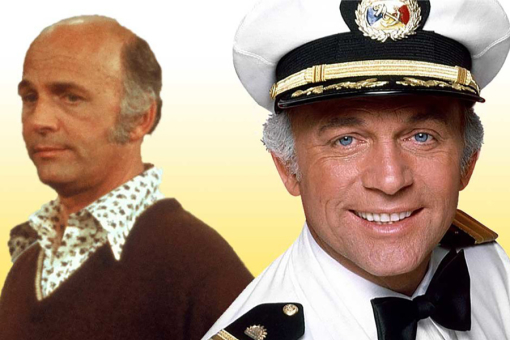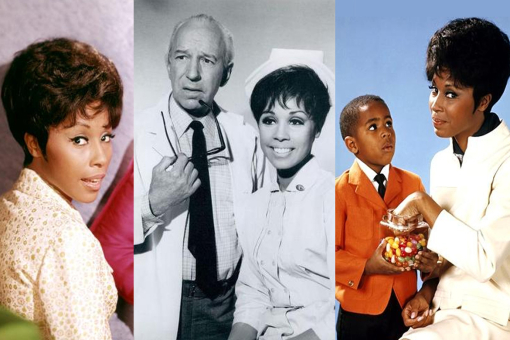Authoring 11 books on beloved TV subjects from Samantha Stephens to Steve Austin might have been enough for the most dedicated of any small-screen buffs.
But now thanks to Shout! Factory TV, lifelong-TV-fan-turned-authority Herbie J Pilato is taking that passion to the next level —and he's still pinching himself.
Starting July 1, Pilato began talking about retro TV…one-to-one with his heroes … right on that same small screen with Then Again with Herbie J Pilato, his own half-hour streaming series themed to beloved classics like Batman, Dark Shadows, My Three Sons, The Wild Wild West, and the classics of producer Garry Marshall.
On the day we caught him wrangling the ever-gregarious Ed Asner about The Mary Tyler Moore Show and beyond, Pilato, whose new celebrity biography, Mary: The Mary Tyler Moore Story, was recently published by Jacobs Brown, was clearly still on cloud nine about what had become of his passion, at this stage of his career.
"It sounds corny, but it's true: I get to sit down and be the voice and the face for the classic TV world—it's a responsibility!" he beams. "So I want to be successful for everybody on the crew. We all love classic TV, and we're bringing that spirit to the show. It's a dream come true."
But why that dream? The Rochester, NY native known to everyone as "Herbie J" turns reflective: "Everything that I've done has brought me to this moment," he says.
"I grew up in the inner city, which was rough, and I was bullied and picked on a lot," he says. "And I gravitated, like many of us in the '60s, to escapism television. Like Bewitched and Star Trek and I Dream of Jeannie and all the rest—all the great shows of the '60s."
After getting his degree near home, he came out to UCLA to study film and TV and snared an 18-month internship at NBC, where he made his network debut as a page helping Johnny Carson with audience prizes on The Tonight Show.
It was also the moment that 1985's Jeannie 15-year reunion project was causing a big stir on the lot en route to racking up the highest TV movie ratings ever.
"And I thought, well if there's ever going to be a reunion of a hot blonde magical woman and a dark-haired guy, it should be Bewitched!" he laughs. "So I wrote a reunion for Bewitched—I loved the show since I was a kid. Elizabeth Montgomery didn't want to do it, so I said, How about we do a book?"
Easier said than done: He needed six months and her husband-producer Bill Asher to coax the notoriously private Montgomery into doing the long interview.
Seven more titles soon followed—more Bewitched, two from Kung Fu, and The Bionic Book among them— before he branched out to consult on the two-hour Bewitched segment of E! True Hollywood Story, DVD docs, several A&E Biography specials and even their Sci-Fi Channel equivalent, dubbed Sciography.
"I always liked to sing and dance and write and act," Pilato says, "but none of those other things were happening for me. So, I focused on the writing. I thought, "Well, if I can't be in a TV show, I'll write about TV shows."
At the time, the burgeoning books and TV work were coming amid a huge personal reset: As a late in life child to older parents, he found himself deciding to pull up stakes, leaving those hard-won West Coast contacts to come home to Rochester during his parents' declining health and his dad's death in 1995.
After 13 years, his role there was done with his mom's death in 2008, but it was real cause for pause as he considered his options: "Can I do this? Can I actually go back to L.A. and start again at 46?" he wondered at the time. In a word, yes.
"Herbie J" not only channeled another batch of classic TV research and titles, but founded the non-profit Classic TV Preservation Society, dedicated to the positive influence of classic TV—with his favorite show's heroine still on his mind.
"Elizabeth Montgomery was very charitable, she had a big heart, she was one of the first celebrities to support those with AIDS, she was one of the first celebrities to support the disabled," he explains. "So, she inspired me. I wanted to do something like that."
But what about the road that eventually led to Then Again? Pilato had no way to know at the time, but 2015 would bring what amounts to a boot camp for the series: moderating hour-long actor-author book talks at Larry Edmunds Bookstore in Hollywood.
A similar one-month "Throwback Thursdays" at the Burbank Barnes & Noble grew so popular with Pilato and his classic TV actor-author buds that it soon became a nearly fulltime weekly fixture—even if, in truth, only a glorified hobby. Until the year-end Christmas special, at least, where "everybody came back" as guests—including producer-author Joel Eisenberg.
"At the end of that, I was exhausted—it went on for 3 hours, like the Oscars!—but that's when Joel pulls me aside and says, 'I want to option this for a TV show.'" So Eisenberg and partner Steve Hillard, and a veritable Who's Who of classic TV faces teamed up to shoot hours of chats for what would finally be a 15-minute pitch reel.
A grateful Pilato says he had but one target in mind: "I want to be the Robert Osborne of classic television! Not that I'm the same character as Robert Osborne," he adds, with a quick and quirky smile. "I want to still make it contemporary, but that is what I wanted to present."
And, he says, Shout! Factory gets it, too.
"They saw the heart that I bring," he says. "And that is a key word for me. Certainly we want to be funny, and contemporary—but there's no mean-spiritedness here. This isn't the 'National Enquirer Salutes Classic TV,' or anything like that. We want to do a classy show and TV eras that mean something, and they have meant something, to people for decades. And continue to.
"And to be able to pay tribute to these stars that have meant so much to so many - and to actually help them get out there."
Still, Pilato is all too happy to mount the soapbox, take on "Peak TV" and tell you that this is not all just about nostalgia. "I think good is good," he declares. "If something was good—like many of those shows were in the '60s, like Star Trek (and I definitely think Star Trek has contributed to this, in particular)—people see good.
"If they're flipping through the channels and they see The Walking Dead — I mean, I don't think we'll be talking about The Walking Dead in 50 years, and how important it was in society, okay? Then they see the bright happy colors of Bewitched, or Mission: Impossible - everything is so vibrant, and the camera stays ON the actors, so they can actually ACT.
"And not all the characters actually look alike, not all the characters sound alike, not ALL the characters are sarcastic, not ALL the characters roll their eyes— it's all you see today. Everybody's snarky and smirky—there's no stories! And there's no differences. Everybody's beautiful. And perfect-looking. Everybody's got perfect hair.
"Now, there's exceptions— don't get me wrong: there's so much talent today, and so many wonderful shows," he says. "But sometimes it gets a little too edgy for me. The old shows have a beginning, a middle and an end—not everything's an arc that goes on forever—and there's happy endings. There are not a lot of happy endings on TV shows today."
And don't mistake classic TV's age for a lack of depth, he'll insist—even in the sitcoms before Norman Lear. It's a passion that kept him chasing Elizabeth Montgomery for six months to interview in the 1980s.
"She finally says to me, 'Why are you doing this?'" Pilato recalls of their first meeting—long before Nick at Night, the Internet and social media made the "nostalgia wave" permanent. Or obvious.
"I told her that Bewitched is about prejudice—how Darrin loved Samantha for who she was and Samantha loved him for who HE was, and not for anything he could buy her because whatever he could buy her she could zap up herself. I saw this prejudice angle, and she LOVED all that. She says, 'I wish I'd thought of that 20 years ago!'"
It turns out her favorite episode of the series was a late one, a 1970 entry called "Sisters at Heart," written by a multi-ethnic class at LA's Jefferson High about Tabitha befriending a young black girl.
And now, he's really wound up about Bewitched.
"This show was good!" he says of his original fave TV classic. "It wasn't just a silly show. I mean, they had people like Danny Arnold, Bernard Slade writing the first two seasons! Danny Arnold did Barney Miller, Bernard Slade went on to write Same Time, Next Year— I mean, he was the story editor of the first two seasons, which many people see as the best of the show."
It's easy to see why Pilato is the man for Then Again. But he's got one more point to drive home.
"I went to Barnes & Noble recently, and this little 12-year-old girl was there with her mom, and she picks up this DVD and she says 'Oh look, Mom, it's Bewitched!' I mean, she's 12 years old, and they're watching these shows! Today!
"They're stopping at Shout! Factory —and all the other retro channels—because they see something different. They see those bright colors that they don't see on Walking Dead—they see something different that we all saw. Good is good, whenever it's made."
And now with Then Again, "Herbie J" gets to share some of the very icons and insights that can prove his point—and make his own dream come true.
Check out Then Again With Herbie J Pilato across all the Shout! Factory streaming services, and on Amazon Prime.
Then Again with Herbie J Pilato has been renewed for a second season, and a spinoff series is planned.

